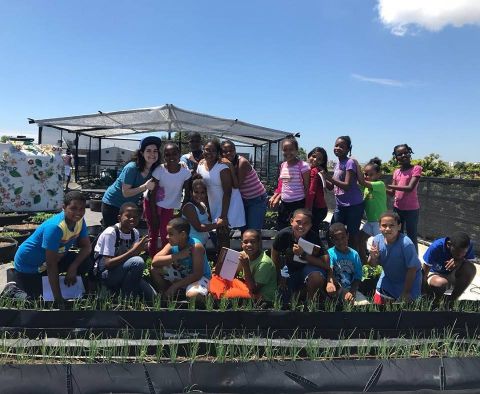
“¡Angie! ¿Hoy vamos al huerto? ¿Hoy vamos a reciclar? ¿Hoy vamos a hacer Parlamento?” Hearing this daily chorus always brings a smile to my face, because these are the programs I work on at Fundación Abriendo Camino. Our mission is to provide alternatives for the protection and education of children, youth and families in a vulnerable urban sector, the barrio of Villas Agrícolas in Santo Domingo. These alternatives include the urban garden, 3R (recycling), and student parliament programs I’ve helped to develop during my two years here. That our students, who largely range from five to thirteen years old and number in the few hundreds, stop me on the street to inquire about them suggests that we’re succeeding at channeling the kids’ talents and interests into fruitful endeavors (quite literally, in the case of the huerto!).
During my time here, I’ve witnessed a genuine transformation in habits and attitudes regarding the environment. The youth of Villas Agrícolas have empowered themselves in Fundación Abriendo Camino’s rooftop garden, organizing into a Brigada Verde that currently has 55 members with more signing up. They water and weed and name our plants, research their nutritional and medicinal properties so that they can give tours to the many adults who visit our center, and sort and prepare the paper and plastic we collect so it can be delivered to a recycling plant.
And they don’t just participate in the garden. They’ve gotten involved with our Parlamento, arguing for the implementation of monthly cleanup days in the streets surrounding our center and for the extension of our recycling program to the neighborhood schools. Both of these proposals won the backing of the public at the Asamblea del Parlamento, were approved by our administration, and have since been carried out. As one of my 10-year-old friends commented during the cleanup in December, “es lindo limpiar.” And this is happening in a neighborhood where “waste management” often means the gutter—at least until the Brigada Verde comes along.
That’s because best of all, our students are spreading what they’ve learned at Fundación Abriendo Camino to the rest of their community. They’re bringing in their parents’ recycling, and they’re bringing home plants so they can start their own gardens. Last week I was pleased to visit one of their schools and see the vertical garden they’ve installed, populated with transplants from our roof. Now we have parents coming to our huerto urbano to buy a packet of mint so they can make a refreshing lemonade for their children, or to get some lemongrass for a tea to help a grandparent fight a cold. Even among our staff—known for our love of cake and toffee—many of my coworkers, themselves members of the Villas Agrícolas community, are picking up chard, leek, and arugula to take home for dinner.
These experiences testify to the importance of engaging kids outside of the classroom, giving them a space to develop their skills and passions in not-so-traditional ways and thus empowering them to drive change in their world. It’s been a privilege to work for an organization that achieves this purpose with so much community backing. If you’re ever in Santo Domingo, stop by the rooftop garden at Fundación Abriendo Camino. The students of the Brigada Verde would love to give you a tour—and they just might convince you to take home some cilantro ancho or orégano poleo!
